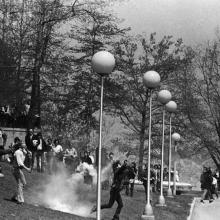Commentary

Man at work cleaning the floor waiting for the reopening of the church. Turin, Italy. Photo by MikeDotta / Shutterstock.com
While states haven’t been imposing restrictions particular to houses of worship, they have thus far been limiting social gatherings, many states restricting groups to no more than 10 people. As they begin allowing gatherings of up to 50 people, and eventually larger gatherings with specific protective restrictions in place, church leaders will be making decisions about how church life resumes.
An acquaintance of mine on Facebook recently posted something different than her usual scripture verses. She shared a petition asking Florida to stop mandatory shelter-in-place orders. “It’s not that I don’t want people healthy, it’s that I don’t want my freedom taken from me,” she wrote.
COVID-19 America has revealed how young it is — that we are a nation still struggling to grow up and figure out who we are. The daily news bears this out.
Are we equipped to muster the political, moral, and spiritual resources necessary to sustain our republic?
Julia Alvarez is a Dominican American novelist, poet, and recipient of a National Medal of Arts award. Her latest novel, Afterlife, came out in April, and her latest children’s book, Already a Butterfly: A Meditation Story, will be released in June. “A Glimpse of the Garden,” an essay by Alvarez on centering prayer, appears in the June issue of Sojourners magazine. Alvarez spoke with editorial assistant, Hannah Conklin, about her newly released books, the connection between her work and spiritual practices, and finding hope during the COVID-19 pandemic.
The victim’s mother told police that within ten minutes of talking to her son, she called the church’s pastor, Mike Roy. Roy asked to meet with the victim’s mother the next day. At that meeting, the mother reported that Roy refused to believe her because “Shawn was a good friend of his and had worked at the church for two years.”
Monday, May 4, was the 50th anniversary of the Kent State shootings. Thirteen students were shot and four killed by the Ohio National Guard during a Vietnam War protest after the invasion of Cambodia. On that day, I was a student up the road at Michigan State University, helping lead Vietnam protests there. It all felt very personal. It still does.
Normally, in moments very unlike our present, I could sit and laugh with extended family without fearing that my presence will expose them to an early death. I could get takeout without having to surgically remove the food from its packaging in a designated clean room like it’s a rupturing spleen. I could even venture to a quiet park where I’m passed too closely by a jogger or family of five without having my existential ire erupt out of me like a sermon, delivered only to my weary family on the way home. Most days I was able to have a tough day at work without having to forage for canned beans and toilet paper in surgical gear at our local Kroger as a nightcap.
Governor Kemp's COVID-19 response, and the killing of Ahmaud Arbery, replay a longer history.
We must urge Senate Majority Leader Mitch McConnell, who has had Rep. Clyburn’s House-passed bill to address this loophole sitting on his desk for a year, to act. And, for the duration of the pandemic, we must urge governors to close this loophole at the state level to give law enforcement enough time to complete background checks. In doing so, we can save countless lives and prevent countless families from experiencing the suffering and heartache that I feel every day.
Marie Dennis, senior advisor and former co-president of Pax Christi International, and Rev. Jim Wallis analyze the importance of government social programs to provide true security to our nation.
In the 18 hours after President Trump publicly mused at a news conference about treating the coronavirus by injecting disinfectants such as bleach and Lysol, 30 calls were made to New York City’s poison control about toxic exposure to household cleaners.
The COVID-19 pandemic has revealed the dark and disturbing injustices and inequities that have always existed in our health care, economy, and government. Though the virus may not discriminate, our humanmade systems and structures do. And in the United States this means that those who are feeling the impact of this disease most acutely are those who have been historically, structurally, systemically, and politically marginalized and oppressed.
Rev. Dr. Cynthia Hale, the founder and senior pastor of the Ray of Hope Christian Church, talks with Rev. Jim Wallis about the need to observe the sabbath during this time of the COVID-19 crisis.
How will progressive Christians react to rising anti-Semitism in this pandemic?
But the church peddles ableist ideas in devious ways: It proclaims to be pro-life but mirrors the world’s messaging that productivity and health are drivers of worth. It weaponizes prayer as a foot-soldier in its ableist theology, reducing God to a slimy vending machine churning out miracles upon request. It limits our imaginations for how abundant life should look, confining prosperity and happiness to a singular mode of living.
In the midst of this COVID-19 pandemic, we are seeing more than ever who is most vulnerable to contracting and dying of this new disease — and it’s a function of often very old and deeply embedded societal structures that create and perpetuate grotesque racial and economic inequity.
Samuel Cruz didn't want to choose between faith and politics. Then he found liberation theology.


















